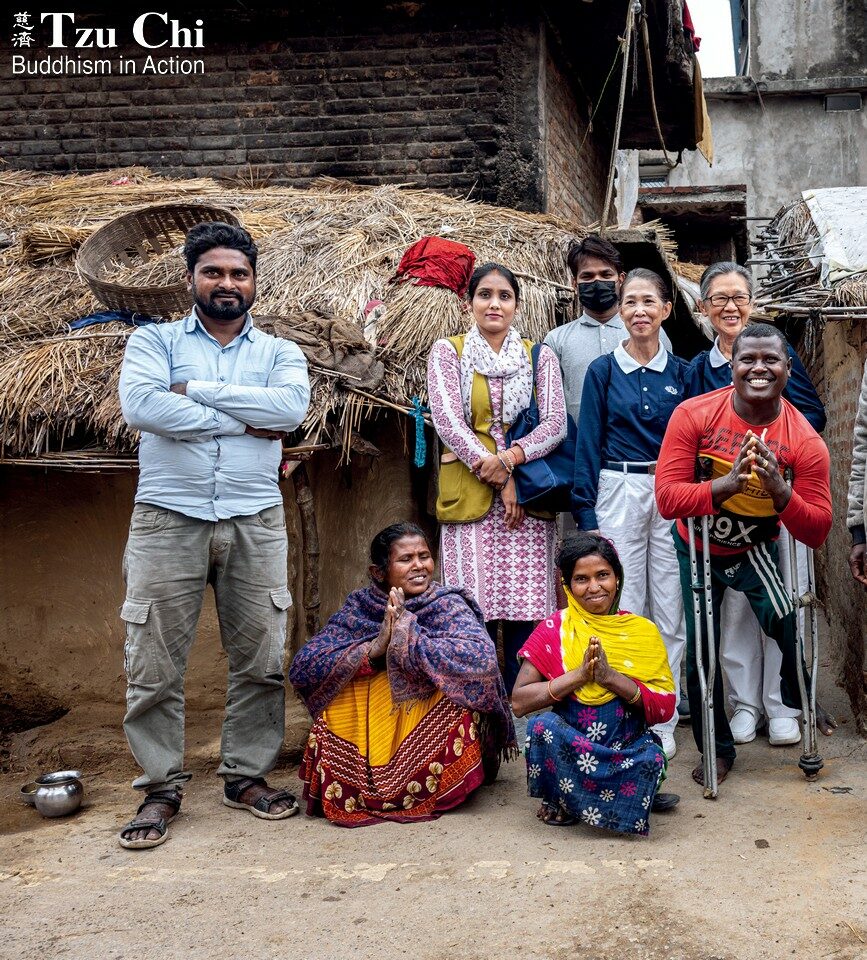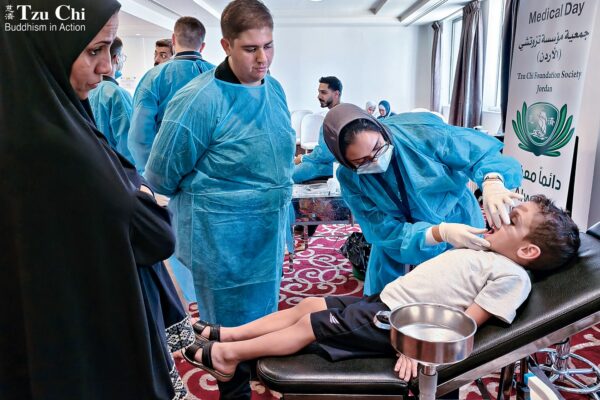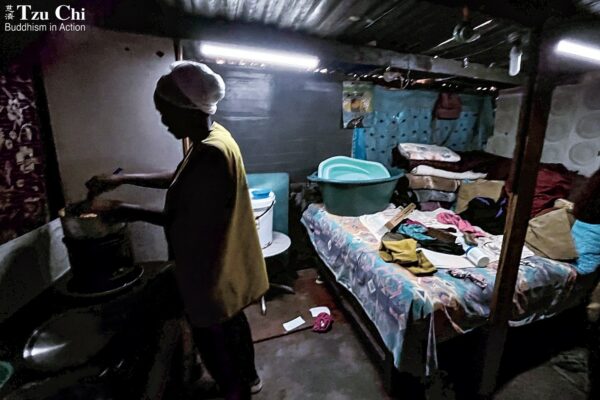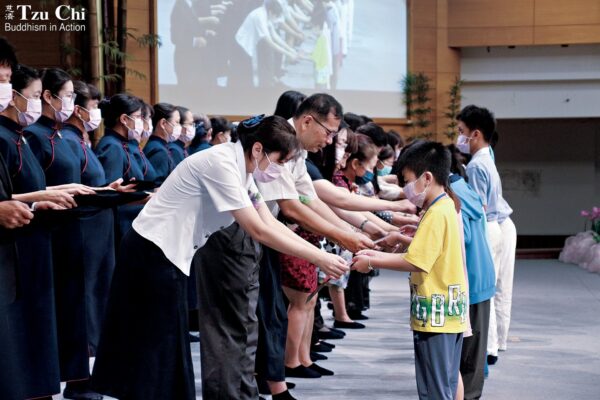
By Zhu Xiu-lian and Lin Jing-jun
Translated by Wu Hsiao-ting
Photos by Hsiao Yiu-hwa
The Mahabodhi Temple, a UNESCO World Heritage site located in Bodh Gaya, India, commemorates the Buddha’s enlightenment. Over two and a half millennia ago, Prince Siddhartha renounced his royal privileges in pursuit of life’s truths and liberation from suffering. One night, while meditating beneath a bodhi tree—now the site of the Mahabodhi Temple—he gazed upon a bright star. With a mind boundlessly expansive, he attained enlightenment. Thus began his journey to spread the Dharma. And now, the story continues…

Emulating the Buddha’s Heart, Embracing the Master’s Mission
Tzu Chi volunteers from Singapore and Malaysia have been stationed in Bodh Gaya since March 2023, providing assistance to impoverished villagers through charitable endeavors, medical services, and educational support. Through their efforts, they live out the Buddha’s teachings of loving-kindness, compassion, and equality, all the while fulfilling Dharma Master Cheng Yen’s aspiration of giving back to the Buddha by uplifting the needy in the very place of his enlightenment. In this picture, Malaysian Tzu Chi volunteer Chin Mee Chwong (陳美聰) is seen visiting an elderly woman in the village of Silaunja. Due to injuries sustained in an accident, the woman can only move forward by crawling.
Tzu Chi at the Site of the Buddha’s Enlightenment
By Zhu Xiu-lian and Lin Jing-jun
Abridged and translated by Wu Hsiao-ting
Photos by Hsiao Yiu-hwa
Survivors were beginning to take steps into a better future as they transitioned from tents to shipping container homes, at the same time that plans for permanent housing were beginning to take shape.
Bakraur, situated in Bodh Gaya, Bihar, India, holds a special place in Buddhism due to Sujata’s act of offering milk-rice to Prince Siddhartha, who later became the Buddha. This kind gesture helped Siddhartha regain strength after six years of asceticism and allowed him to eventually attain enlightenment under a bodhi tree. Bakraur now hosts the Sujata Temple and the Sujata Stupa, attracting both pilgrims and tourists.
India’s peak tourist season runs from November to March, during which bus after bus ferries visitors to the Sujata Temple. Upon disembarking, they are often met by beggars from the lower castes around the temple and nearby areas.
This phenomenon arises from several factors. People from lower castes often face limited job opportunities and lack education, which makes earning a living difficult and perpetuates a cycle of poverty. For them, begging is a means of survival.
Many visitors to the temple are devout, compassionate Buddhist pilgrims. When encountering groups of beggars at the temple, including the elderly and disabled, many pilgrims feel empathy and offer alms, inadvertently encouraging habitual begging in this area.
Beggars at the temple typically arrive around seven in the morning and leave around five. Their daily earnings vary, with some fortunate enough to collect around 150 to 200 rupees (US$1.80-2.39).
Gaina Manjhi, an elderly resident of Bakraur, used to spend his days beneath a banyan tree near the Sujata Temple, palms upturned, soliciting food or money from tourists. Though employed in his younger days, he eventually turned to begging to survive. Sympathetic villagers, who saw him face ridicule and bullying on the streets, reported his situation to Tzu Chi in April of last year. Since then, he has been receiving monthly provisions from the organization.
The temple remains Gaina Manjhi’s “workplace,” but instead of begging, he now sells wooden Buddha statues, stupas, and textiles to visiting pilgrims and tourists. He may fail to sell a single item all day and make less than he did begging, but he does not consider himself poorer. Whenever Tzu Chi volunteers from Malaysia or Singapore visit his village, he guides them, explains things to his fellow villagers, or prevents the village’s cows from charging at the visitors. Volunteers have offered him wages, but he has turned them down, insisting that he already has enough to get by. He expresses a desire to try to be self-sufficient.
Gaina said that although he cannot venture far due to his low caste, within his limited scope, he can still assist Tzu Chi in caring for his neighbors. From begging to benevolence, he embraces his new identity as a Tzu Chi volunteer!

A household under Tzu Chi’s care has achieved self-sufficiency and agreed to discontinue aid. Volunteers are happy to see this development.
Compassion exists in everyone
On the morning of March 17, 2024, Gaina Manjhi and more than 30 others gathered at the Tzu Chi Bodh Gaya office for a training session. Among them were housewives, schoolteachers, college students, and village heads, all of whom were Tzu Chi trainee volunteers. They were scheduled to complete a series of classes and engage in various activities, including charity, medical care, and education, with the aim of attaining formal certification as Tzu Chi volunteers. Their first training course took place on January 21.
The March training day focused on the mission of charity, with Vivek Kumar serving as the host. He had been part of the Tzu Chi team that visited Gaina Manjhi for the first time last year. Among the attendees of the day’s course was Vikash, who lives in Bakraur, just like Gaina Manjhi. “Gaina Manjhi’s transformation into a helping hand for others has greatly inspired me. It motivated me to become a volunteer too.”
Sudha Kumari, another trainee volunteer, graduated from an English diploma program. She is fluent in English but struggled to find a suitable job until encountering Tzu Chi last year. Now a participant of Tzu Chi’s work relief program, she assists volunteers with home visits and communication with villagers. As a local resident, she provides valuable insights into local life to volunteers from Malaysia and Singapore.
Sudha had participated in Tzu Chi’s year-end blessing ceremony performance of “Thousand-Hand World” a few months earlier. During rehearsals, she noticed that many of her fellow performers hailed from lower castes and had faced unimaginable difficulties in their lives. “If I had treated them as inferior and avoided contact with them, I’d have contradicted Tzu Chi’s spirit, which emphasizes equality for all,” she reflected. She added that taking part in Tzu Chi’s work and meeting more disadvantaged people had led her to a deeper understanding of the meaning of the lyrics of the song used in their performance: that the power of one person is limited, but when 500, a thousand, or even more people are willing to lend a hand, countless others will have an opportunity to be saved.
“She has become much gentler and kinder since joining Tzu Chi. Her way of speaking is different now,” remarked Sudha’s husband, Vishal Singh. Vishal, who works in a laundry shop, is pleased to see Sudha’s transformation. With Sudha now employed in Tzu Chi’s work relief program, their family’s financial situation has stabilized. But financial stability aside, Vishal is even happier to see his wife’s transformation. He wholeheartedly supports her involvement with Tzu Chi, saying, “I fully support her in doing good deeds!”

Tzu Chi volunteers circle the Mahabodhi Temple, quietly reciting the Sutra of Innumerable Meanings, which forms the foundation of Tzu Chi’s Dharma lineage. The temple marks the site of the Buddha’s enlightenment.
Buddha Juice
Bhimsen Prajapat, another villager from Bakraur, was invited to the training session to share his “entrepreneurial experience” with the trainee volunteers.
Six years ago, Bhimsen, an electrician by profession, suffered an electric shock that left him in a coma. When he regained consciousness, he found himself grappling with diminished memory and physical strength, making it difficult to return to his former job. Hearing of his plight, Tzu Chi volunteers visited him and learned of his desire to support his three children’s education through his own efforts. In response, they helped him set up a juice stall, providing a customized cart and a juice extractor. In gratitude, Bhimsen named his stall “Buddha Juice.”
Volunteers have checked in on him several times since he established his stall to see how his business is faring. During their visits, they also remind him to maintain cleanliness. His business does well, earning him between 1,000 and 1,500 rupees (US$12-18) a day.
During the training session, Bhimsen recounted how he got back on his feet after his accident. He also shared his thoughts about Tzu Chi. He talked about a touching moment during a Tzu Chi winter distribution during last year’s Diwali festival, during which he was deeply moved to learn how, in the early days of Tzu Chi, despite very limited resources, Master Cheng Yen was still determined to help the needy. This experience illuminated for him the profound power of compassion. He also resonated with Tzu Chi’s belief that emotional support and nurturing love are just as important as material aid when helping others.
Chin Mee Chwong, a volunteer from Malaysia, addressed the trainees, explaining the origins of Tzu Chi’s charity work in English while Sudha translated. She then highlighted several major aid projects Tzu Chi had undertaken in Bodh Gaya since last year, such as assisting five households affected by a fire in Silaunja to rebuild their homes. “Currently, Tzu Chi is providing long-term aid to 25 families in five villages,” she added. She clarified why volunteers had visited over 110 needy households but did not provide assistance to all. This was because Tzu Chi’s aid is based on principles of timeliness, priority, and directness. Priority is given to cases involving the elderly without support, those suffering from serious illnesses, single parents supporting their children’s education, families with disabled members, and individuals unable to support themselves.
Chin, with extensive charity experience in Malaysia, compared her philanthropic work there to her experiences in India. She said that the living environment in India is simpler, and thus monetary aid is not the main focus. Instead, Tzu Chi provides monthly material assistance to households, averaging around 2,000 to 4,500 rupees (US$24-54) in value.
She stressed that Tzu Chi aims not just to provide aid but also to empower households to become self-sufficient. She used Bhimsen as an example. His juice stall had enabled him to have a stable income, and he had also found additional night shift work. Consequently, she discussed with Bhimsen’s wife whether Tzu Chi could cease aid, and the wife readily agreed. Nonetheless, volunteers will continue to provide emotional support to the family. As for Gaina Manjhi, whose stall business has not yet seen good results, volunteers will continue to find opportunities for him to escape poverty.

Gaina Manjhi (right), formerly a beggar, now sells Buddha statues outside the Sujata Temple to make a living. The statues are supplied by Malaysian volunteer Sio Kee Hong (center). A pilgrim (left) expressed admiration for Gaina’s transformation from beggar to vendor and volunteer.
Multiple approaches to doing good
Tzu Chi volunteers from Singapore and Malaysia have been taking turns staying in Bodh Gaya since March 2023. Have the villagers’ lives seen any changes since then?
Tzu Chi’s first charity case in Bodh Gaya was Samphul Devi, a stroke survivor. Volunteers visited her for a year, providing daily necessities, accompanying her to medical appointments, and installing rehabilitation equipment—all in hopes of her recovery. Sadly, on April 16, they received news that she had suddenly passed away. They hurried to comfort her mother and attended her cremation ceremony.
Tzu Chi’s first medical case involved Mithun Kumar, a nine-year-old boy who suffered severe burns from an electric shock while climbing a tree. With Tzu Chi’s assistance, he underwent two surgeries last April and July. Today, thick black hair has grown on his scalp, though a few scars remain visible.
Mithun had been out of school for over two years because of his injuries. Now healed, he eagerly returned to school. Wearing his uniform and flashing a shy smile, he told Tzu Chi volunteers, “I love going to school. My favorite subjects are Hindi and English. I want to become a teacher in the future.”
These cases show that while some individuals have seen improvements in their lives with Tzu Chi’s help, there are circumstances beyond the volunteers’ control that prevent all efforts from succeeding as hoped.
Rather than aiming solely to change the lives of the impoverished, Tzu Chi’s efforts in Bodh Gaya over the past year have also aimed to inspire a shift in the villagers’ mindsets. In Jagdishpur, Dinesh Kumar, the village head, assists volunteers in conducting health checkups and providing milk or legumes to those suffering from malnutrition. Through his involvement with Tzu Chi, he learned that charity can take various forms, including sharing good ideas. For instance, Tzu Chi volunteers introduced concepts like coin banks or rice banks, encouraging everyone to contribute what they can to help those in need.
However, life is a struggle for many impoverished villagers, making it difficult to contemplate giving money.
On March 15, Vivek Kumar, Gaina Manjhi, and others visited Niranjana Public Welfare School in Bakraur to hold a Tzu Chi gathering. Sudha Kumari went to villagers’ homes to invite them to the school, and soon nearly 70 people came, filling the venue. Vivek first introduced Tzu Chi’s activities in Bodh Gaya over the past year and then screened a video based on the Buddha’s teachings entitled “Seven Ways of Giving Without Spending Money.” Sudha provided simultaneous explanations in Hindi during the screening.
Villagers shared their thoughts after watching the video. Mithun’s mother said that the ideas shared in the video made her realize that she could give by caring for the elderly in the village. Ram Kumar Raman, a recipient of Tzu Chi’s care due to illness-induced poverty, said, “Many people think you need money to give, but they don’t know there are ways to give without spending money. I like it because I’m not wealthy, but I also want to help elderly people living alone.” Vivek Kumar believes that even if villagers don’t fully grasp the content of the story, as long as they are willing to listen, change is possible. When everyone shows love and helps others, their community will become a better place.

Tetari Kumari, fitted with a prosthetic leg with Tzu Chi’s help, practices walking with the assistance of volunteer Lim Kim Yan (林金燕), a retired nurse from Singapore.

Tzu Chi provides sewing classes at its Bodh Gaya office to equip women with marketable skills.
Keep going
Tzu Chi volunteers have been in Bodh Gaya for over a year, but many challenges remain. Lee Lay Hua (李麗華), a septuagenarian from Malaysia with over 30 years of experience in Tzu Chi’s charitable endeavors, believes that they must embrace their work in India as a completely new experience and confront challenges head-on. “Their way of life has remained unchanged for thousands of years,” she said. “It takes time to make a significant difference. We also need the help of many local volunteers.”
Despite the challenges, Avinandan Kumar, a science teacher, commended Tzu Chi. He observed that since Bodh Gaya is where the Buddha attained enlightenment, many foreign groups have visited the area to provide assistance, such as building toilets, installing water pumps, and distributing food. However, this has inadvertently nurtured a culture of dependency and entitlement. “Tzu Chi’s efforts, on the other hand, are commendable,” he said, “and I hope other organizations will adopt similar approaches. For example, before offering assistance, there should be conditions, such as requiring villagers to ensure their children attend school; otherwise, they will never experience meaningful improvement in their lives.”
As volunteers visit village after village, they find many villagers only able to work as construction site laborers or farmhands, struggling to earn a stable income. Due to low levels of education, many people have difficulty reading or writing, making vocational training necessary to secure steadier jobs.
Sio Kee Hong (蘇祈逢), deputy CEO of Tzu Chi Kuala Lumpur and Selangor, shared a statistic: more than half of Indian women are willing to work in paid positions, yet female labor participation has declined from 32 percent 20 years ago to below 20 percent today. Tzu Chi is currently conducting sewing classes for 25 women in Bakraur and Silaunja to equip them with skills to improve their families’ economic situations. There are also English and computer classes, but those have more male students than female.
The day after the March 17 training session, volunteers resumed their work: the medical team conducted health checkups and distributed nutritious food, the charity team visited the Sujata Temple to assess Gaina Manjhi’s business and explored alternative product sources to help improve his business, while the education team discussed Jing Si aphorisms teaching materials and held a class in Ganga Bigha. Inside the Tzu Chi Bodh Gaya office, people came and went, attending sewing, computer, or English classes. Everyone continued to do their best to sow seeds of hope and change.



